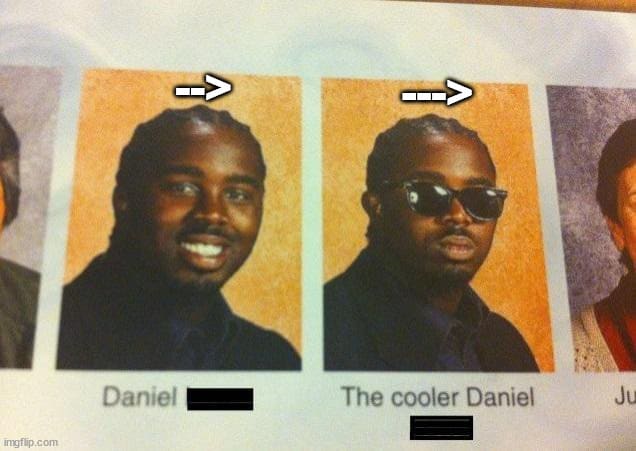Article::Article
In my previous article, I used the long arrow -->, but it is possible to use an arrow even bigger! Your dreams are now a reality, let's make an entrance for the very long arrow --->
How? The same way that --> is a combination of -- and >, the very long arrow ---> is the combination of -- and ->.
Reminders about operator ->
The operator -> and its overload are a bit special. For the rest of the article I will assume that you know how it works. If that's not the case, I recommend you to read:
- this article if you read French
- otherwise the first response of this Stack Overflow thread
Implementation
Basic
The first step is to define two classes: Base and Extension. Then overload the operator -- of Base to create and return an object of type Extension. After that, overload the operator -> of Extension to return a pointer to itself. The last step is to add a member function to Extension. It is now possible to use a very long arrow --->. Here's the code:
#include <utility>
#include <iostream>
struct Base {};
struct Extension
{
const Extension* operator->() const
{
return this;
}
void print() const
{
std::cout << "long arrow" << std::endl;
}
};
Extension operator--(const Base&, int)
{
return Extension{};
}
int main()
{
Base base;
base--->print();
}
Possible usage
The previous example is totally useless, let's see a possible usage of what you can do with it: extend a class without touching it.
Let's imagine I want to add a simple method to std::string, like something to transform it from upper case to lower case. It is possible to do this:
#include <cctype>
#include <string>
#include <iostream>
#include <algorithm>
struct StringExtension
{
StringExtension* operator->()
{
return this;
}
void to_lower()
{
auto lower = [](unsigned char c) { return std::tolower(c); };
std::transform(str.begin(), str.end(), str.begin(), lower);
}
std::string& str;
};
StringExtension operator--(std::string& str, int)
{
return StringExtension{ str };
}
int main()
{
std::string str = "HELLO";
str--->to_lower();
std::cout << str << std::endl;
}
The logic is simple: create a class with all the member function we want to add with a reference to the class you want to extend. Overload the operator -> of this new class to return a pointer to itself and then overload the operator -- of the class you want to extend returning an object of the extension class. That's it.
Article::~Article
That's add another string to your bow and you can be special snowflake that uses very loooooong arrows.
I hope you enjoyed this article as much as me when I wrote it and that you will find something funny, or even useful, to do with what you learned.





Top comments (2)
I suppose the
--->>>operator is next.If I could make it work I would absolutely do it!
I thought about making -->> but I think it would be a bit redundant